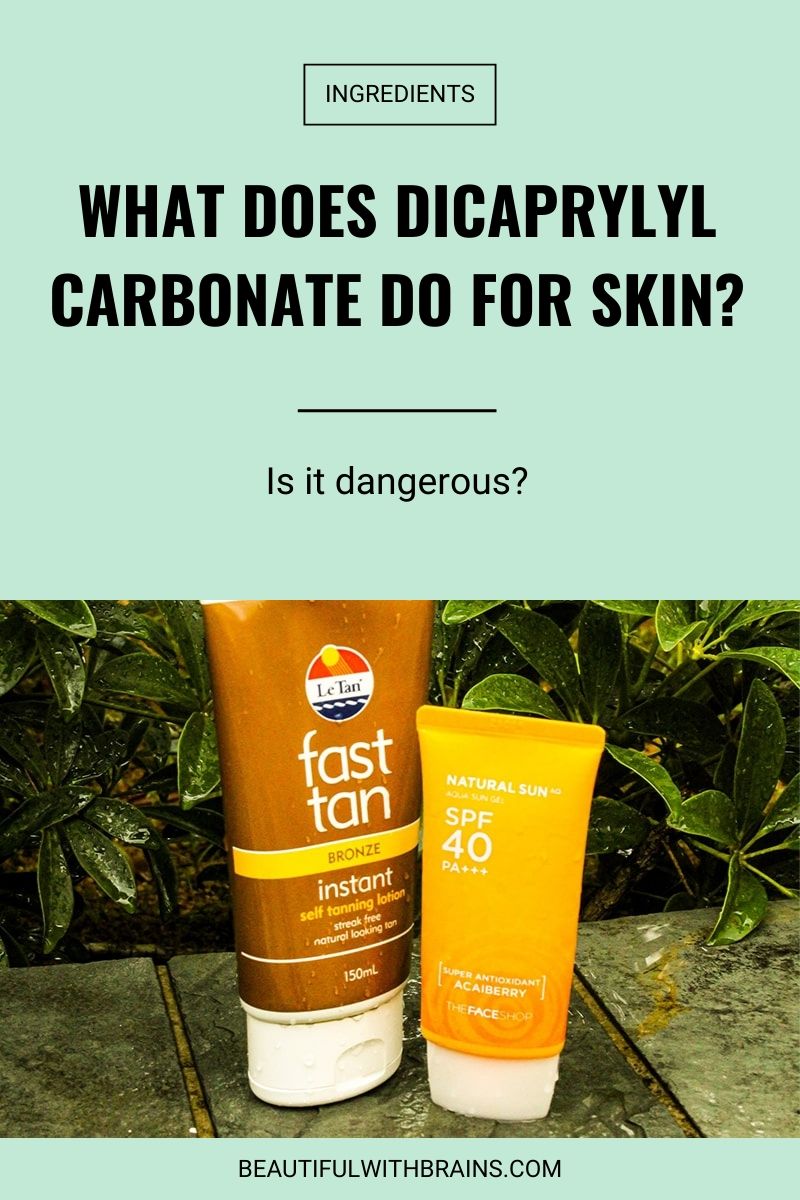
Have you heard of Dicaprylyl Carbonate?
It’s one of those ingredients that lurks in almost all your skincare products and has a suspect name that makes it look a little… well, it’s not natural, is it?
Should you worry? Not really. Here’s why:
What Is Dicaprylyl Carbonate?
Dicaprylyl Carbonate is a colourless and odourless (almost!) oil. It can be derived from from vegetable, synthetic and animal sources.
The type used in skincare is usually synthetic. But that doesn’t make it bad. Don’t judge an ingredient by its origin. Judge it by its effectiveness and safety.
You may be wondering, why do brands even use synthetic ingredients like this in the first place? Synthetic versions are often more stable, meaning they don’t break down as easily when exposed to air or light. This stability helps ensure your skincare products work as intended for longer.
Another thing to note: synthetic ingredients are sometimes purer than their natural counterparts. Natural oils can contain impurities that may irritate sensitive skin, but synthetic versions are refined to avoid this. So, when you see Dicaprylyl Carbonate on the label, know it’s there to do its job without causing unnecessary harm.
What Does Dicaprylyl Carbonate Do For Skin?
Dicaprylyl Carbonate is an emollient. A “dry emollient”, to be precise.
What the heck does that mean? It moisturises skin, leaving it softer and smoother instead than greasy and oily. No residue with this one.
It works by creating a protective film on your skin that strengthens its protective barrier. This reinforced barrier:
- Keeps moisture from evaporating, leaving your skin hydrated and supple for hours on end.
- Keeps germs, pollutants, and other irritants out of your skin, so they can’t irritate it and wreak damage.
- Better withstands the attacks of harsh weather, preventing your skin from drying out.
This is especially important if your skin is dry and/or sensitive. Your skin’s natural barrier is already compromised, so you need all the help you can get to fix it up again.
Wondering how this compares to other moisturizers? Unlike heavier oils that sit on the skin’s surface and feel greasy, Dicaprylyl Carbonate sinks in quickly. This makes it a favorite in lightweight formulations like sunscreens, serums, and gel-based moisturizers.
Related: How To Strengthen Your Skin Protective Barrier (And Why It Matters)
What Else Does Dicaprylyl Carbonate Do in Skincare?
Dicaprylyl Carbonate has excellent spreadability and helps other ingredients with slow spreadability glide on more easily, too.
This is why you’ll often find it in sunscreens. A lot of UV filters (like Octinoxate) have thick textures that are hard to spread. But add this baby to the mix and voilá, it glides on like a dream and feels lighter on the skin to boot.
Because texture matters. It doesn’t matter how effective a sunscreen or moisturiser is. No one wants to use a thick paste that takes 20 minutes to put on.
Does Dicaprylyl Carbonate Have Any Side Effects?
Nope. Dicaprylyl Carbonate is generally considered to be safe.
Sure, it’s possible some people may be allergic to it. You can become allergic to anything at any time, remember? But even this is rare.
This is one of those chemical ingredients that moisturises skin without doing any harm.
P.S. While we’re on the subject, EVERYTHING is a chemical, including water. Just saying…
Is Dicaprylyl Carbonate safe for acne-prone skin?
Yes! Its lightweight, non-greasy texture makes it a great choice for oily and acne-prone skin types.
Does it have any environmental impact?
Like many synthetic ingredients, Dicaprylyl Carbonate is formulated to be safe for humans, but its environmental impact depends on how it’s sourced and manufactured. If this concerns you, opt for brands with transparent sustainability practices.
The Bottom Line
Dicaprylyl Carbonate is an excellent emollient that makes skin softer and smoother and helps other ingredients better spread onto your skin. Don’t be scared of it. It’s a friend.

There’s a typo in the title: you -> your
Boris, thank you for letting me know. I’ll fix it now. 🙂
Do you know what kind of vegetable is used when it is vegetable based?
Rachel, it is usually derived from coconut or palm oil.
Thank you!
You’re welcome.
Hi! Do you know what is its comedogen index?
THANKS!!! 😉
Eszter
from Hungary 😉
Eszter, hi. No, I’m afraid I don’t. I checked out a few comedogenicity charts, but this one wasn’t on any of them. 🙁